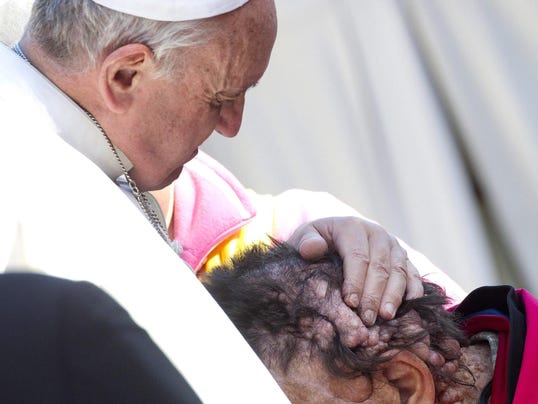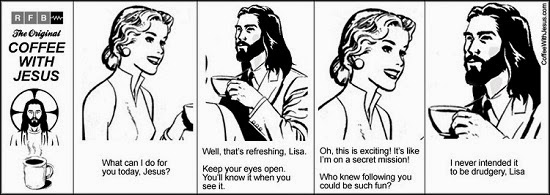Romans 14: 1-12
New Ark United Church of Christ,
Newark, DE
September 14, 2014
 |
When David and I first
got married, we made an effort not to fall into the typical gender roles. We took turns mowing the lawn. We paid the bills together. We both like to cook. The laundry got done one way or the
other. When we had Andrea, David would
get up with me when I would nurse her in the middle of the night.
But
after I stopped working, and even more so after we had Olivia, he was paying
the bills and mowing the lawn, and I was cooking dinner and doing the
laundry. It was just so easy because it
also played to our skills. I wanted to
rebel and yet it was oh so comfortable.
I
once saw a set of cocktail napkins with two different images. One had an image of a man, 1950’s style, with
the words “Don’t assume I fix things”.
The other had an image of woman in similar style with the words “Don’t
assume I cook”. As much as the last
century of social movements has done to liberate us from stereotypes and
prejudice, it still takes a considerable amount of conscious effort to approach
a human being as just that: another human being.

Jennifer
Finney Boylan, in her transgender memoir entitled “She’s Not There”, writes
about how she struggled with her eating habits once she began presenting as
female. She would order diet soda and a
spinach salad when what she really wanted was barbequed ribs and a beer—you
know, real food. She writes that she
realized she had bought into the madness that she had spent years imploring her
students to fight against. As she began
to own her true identity as a woman, she found that what she was really after
was to belong. But in the end Jennifer saw that at times she
was trying to prove she was truly female by oppressing herself.
As
egalitarian as I think I am, I have found myself sorting people into neat
little categories; in effect, oppressing their ability to surprise me, their
birthright to be themselves. A few years
ago, in my role as a floating pastor, I was visiting a woman in her home in
Redding, CT. Redding is an upper-middle
class town in what some Connecticut folks call a rural area, which really means
the zoning per home is more than an acre.
Arlene
lived at the end of a small lane. Her
house was sizable but she was confined to one level; she couldn’t manage even
a single step up or down. Her living
space was the size of a great room. She
had a handicapped bathroom installed and a small kitchen space for a fridge,
sink, a small oven, and a few cupboards.
The rest of the room was filled by her bed, a small fireplace, and a
sitting area where she could watch TV and have a visitor.
We
talked about faith and what it means to be a human being. Like some New Englanders in the
Congregational church, Arlene was more of a Unitarian Universalist in her
beliefs about God. She was also very
progressive in her views about homosexuality.
She was a feminist.
At
some point I asked her if I could use her powder room. Rather than use her personal bathroom, she
directed me to another bathroom in another part of the house. On my way there I passed a beautiful grand
piano; I made a mental note to ask her if she was a musician. But then I stopped in my tracks: on top of
the piano was a bust of former president Ronald Reagan. It was all black and stood about a foot high. Arlene was more than just a fan; she was GOP tried
and true.
Later
in our visit, as I was still trying to put her Republican passion with her
progressive theology and social views, Arlene then told me that she was having
her living space redecorated—to look like an Egyptian tomb. She described in great detail wall sconces,
furnishings, paintings, statues, even hieroglyphics on the wall.
It
was then that I realized in my bones that I could no longer assume anything
about anyone. The longer I live the more
I am of the opinion that there is no universal human experience, save that
we’re born, we live, and we die. That
though we all live in these fragile cases of skin and bone, blood and flesh,
each experience of life is unique.
When
I was about six years old, I can remember looking into the mirror and thinking
that I was the only person who had to look into a mirror to see themselves; as
if this whole existence was a play on a cosmic stage with me as an audience of
one. It wasn’t long before that illusion
was shattered. Then when we have our
first “you too?” experience, we feel the joy of not being alone but we also
begin to surround ourselves with people similar to us. Pleasure-seeking, pain-avoidant creatures
that we are, we’re a long way from going boldly where no one has been before,
let alone making camp with a stranger so very different from us.
The
miracle of church that Paul is describing to the Romans is that we can be
church, we can be community for each other, and
we can be different from one another.
What makes this possible is when we acknowledge that God is in the
driver’s seat: “Every knee shall bow to
me and every tongue shall give praise to God.”
As Anne Lamott puts it, “I surrendered. I lay down my weapons and went over to the
winning side. I am a recovering Higher
Power.”
When we size up another human being
and find them lacking in some way, we have put ourselves in the driver’s
seat. But what about our expectations,
we say? Our expectations often say more
about us than they do about what we hope to get out of someone else. What expectations do we have of a God who
willingly became weak and suffered for the sake of love? We have no idea what it is like to be someone
else until we put aside all our experience as a human and listen to
theirs. It’s too easy to sum up a person
with shorthand, see them through our imperfect lenses. It takes hard work to
discover layer after layer of suffering and scars, of living and loving until
we see that tender soul that lives within all of us.

That tender soul is an image of God,
an imprint of holiness, a unique expression of the divine trying to know
itself, and not only know itself through its own experience but also through
the lives of others. Imagine the
interconnectedness: me knowing myself, you knowing yourself, my experience of
you, your experience of me, our shared experience of our connection, and then
they told two friends, and so on. The
divine looking out through your eyes into mine, the divine in me looking
through my eyes into yours, and it makes all the difference in the world
whether we are looking with compassion, love, and forgiveness or with fear,
judgment, or with just plain old assumptions.
This is why I think looking into the
eyes of another is one of the highest forms of prayer: because what we see and how we see each other
has the power to change us and to change the life of another. Jesus looked into the eyes of those he healed
and spoke to and called and saw someone who wanted to know that they belonged,
that their journey on this earth mattered, that they were worthy of love and
care.
Remember that Joan Osborne
song? “What if God was one of us? Just a slob like one of us? Just a stranger on the bus trying to make their
way home? Like holy rolling stone.” We’re all just trying to make our way home,
all just trying to find our way, all of us transgressors, travelers, testing
God’s patience. None of us are
experts. We’re all a work in progress,
for God is still speaking. In the words
of the poet Antonio Machado, “Wanderer, your footsteps are the road and nothing
more; wanderer, there is no road; the road is made by walking.” Thank God we don’t have to walk it by
ourselves.
Amen.









